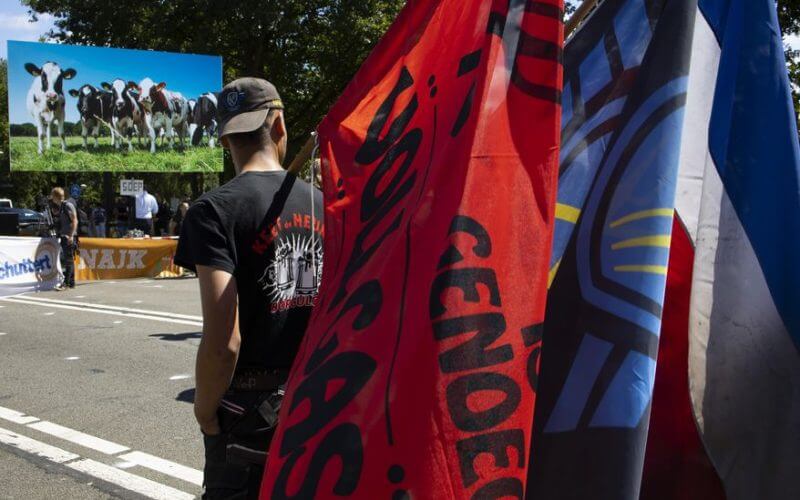In the Netherlands, with an intensive agriculture economy and the highest nitrogen emission in Europe, Dutch farmers continue to protest their government's strict environmental regulations required by the European Union, which could destroy the livelihoods of many farmers and their families.
In response to the regulation, thousands of Dutch farmers have protested outside government buildings and homes of ministers, driving hundreds of tractors to blockade food warehouses and grocery stores. The movement gained international attention from the United States and spread into other Western European countries like Italy, Germany, Spain, and Poland.
According to reports, cows in the Netherlands produce 27 liters of milk a day and drink up to 100 liters of water, resulting in the excretion of solids and liquids, which, when mixed, are a huge source of nitrogen emissions.
To cut back on this population, farmers have changed the way they work on the farms, investing in new floors that separate urine from dung, which Dutch government officials say is not enough to reduce nitrogen emissions by the year 2030 to comply with the European Union's (EU) climate standards. As a result, farmers would have to depart with 40 percent of their cattle, leading to 40 percent less income.
In October 2019, the protests by Dutch farmers began in response to the government's new carbon emissions reduction legislation that impacted farmers the most. In June 2019, the Dutch government revealed plans to enact extreme measures that targeted the country's farming industry, demanding that farms near nature reserves "cut nitrogen output by 70 percent.”
The ongoing protests in the Netherlands has also been part of the climate change and green-energy debate in Western Europe, with economists and energy experts pointing out the policies of climate activists and the impact on the lives of ordinary individuals.
Director of the Center for Energy, Climate, and Environment and the Herbert and Joyce Morgan Fellow in Energy and Environmental Policy at The Heritage Foundation Diana Furchtgott-Roth notes that "fossil fuels are vital to fertilizers and pesticides, which improve crop production and reduce food prices."
"In 2021, Sri Lanka President (Gotabaya) Rajapaksa banned synthetic fertilizer and pesticide imports practically overnight, leaving Sri Lanka's farmers with only organic substitutes. Six months after the ban, rice production dropped by 20%, and tea production declined by 18%. In 2022, with inflation at 55% and the economy in tatters, protestors took over President Rajapaksa's home; his government fell, and he had to flee the country," Furchtgott-Roth told The Foreign Desk.
While experts say that nitrogen compounds from farm animals can harm wildlife and disrupt biodiversity in rivers and lakes, the tradeoff is between protecting ecosystems or maintaining a working Dutch agricultural industry that supports workers while providing the market with affordable products.
“Western agricultural production and food security depend on fossil fuels, and Americans would be foolish to destroy it. Ammonia is a key component of fertilizer manufacturing, and producing it requires natural gas,” Furchtgott-Roth said.
As a result, leftist activists in the EU have called for a complete end to the agriculture industry in the Netherlands, with some going insofar to call for environmental, social, and corporate governance (ESG) policies to change the global economy's capital investment toward companies that are willing to go along with environmental and social values of left-wing activists.
“By following the ESG movement and encouraging others to do the same, countries are sacrificing agricultural productivity and raising food prices. This disproportionately hurts the poor, who spend a higher share of their income on food. Food access for poor people is at stake,” Furchtgott-Roth told The Foreign Desk.
In the last regional election in the Netherlands in March 2023, the farmer-friendly Farmer Citizen Movement (BBB) landed a significant victory in the Dutch Senate, leaving farmers with renewed hope and faith in the elected leaders to reverse the Dutch government's climate-change based policies.
The nitrogen plan will buy out current farmers in areas in the Netherlands with low biodiversity affected by nitrogen emissions.
Organizations like Greenpeace want to force the Dutch authorities to act now, preparing to sue the government to demand that they lower emissions five years earlier. Farmers who have not stood up against such demands by climate activists have adhered to their measures, keeping only 45 cows on their farms, and calling for a complete overhaul of the country's intensive agriculture.
On the issue of sustainability, Furchtgott-Roth points out that the term has "come to mean not using efficient, dense sources of energy that modern countries enjoy" and is "based on the perception that rising temperatures, rising sea levels, and 'extreme weather events' such as hurricanes, cyclones, and wildfires, are linked to greenhouse gas emissions."
“Despite the billions of dollars spent by international aid organizations, many people lack food, modern energy, electricity, and running water. One third of the Earth’s population needs dense energy to bring them up to Western standards,” Furchtgott-Roth said.
“Countries will never reach Western income levels using only wind and solar—the energy sources dictated by climate envoys John Kerry and Amos Hochstein and other Western politicians. In trying to impose policies that discourage energy use, Western elites would condemn billions of people around the world to impoverished lives and hunger,” she stated.
Experts say the attempts to destroy Holland's farming industry will put thousands of farmers out of work, reduce food availability, and increase food prices internationally. Framers in the Netherlands have argued that advancing agricultural progress rather than destroying it would have better environmental impacts, given that new innovation provides a clear path to sustainability, requiring capital to invest in new processes and experimentation.
In addition to farming facing attacks by climate activists in the Netherlands, the country's economy also faces problems thanks to adherence to climate activists. In 2019, a court ruled that any new construction must be within European limits, with some regions no longer building homes or office buildings. The Netherlands faces a housing crisis over the lack of home building, but government officials have vowed to build one million homes in the next 10 years.
“If the world gives up its energy and agricultural security, countries will be left with the insecurity of higher food and transportation costs, higher electricity costs, and lost jobs, with decreased food access. Climate change is going on, as it has for millennia, and may result in rising sea levels. But using less energy and making food more costly will leave people in these areas and around the globe worse off. Sri Lanka President Rajapaksa learned this the hard way. The Dutch are discovering it now,” Furchtgott-Roth said.
Related Story: Pentagon Distributes ‘Climate Literacy’ Questionnaire to Service Members, Civilian Employees









